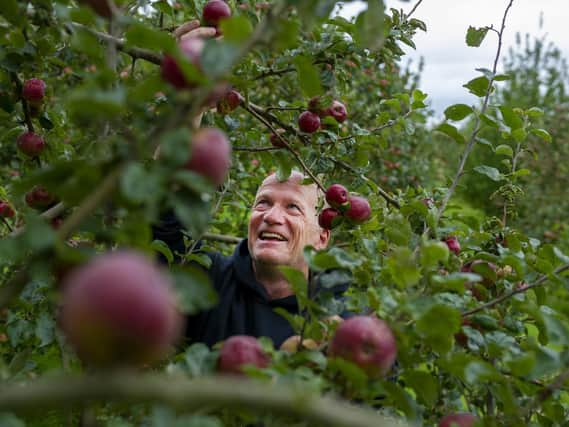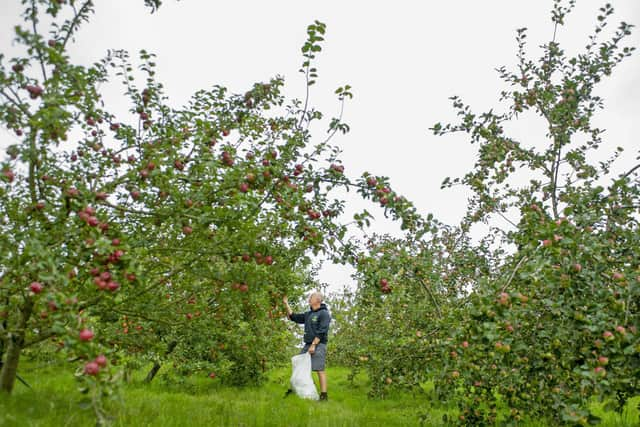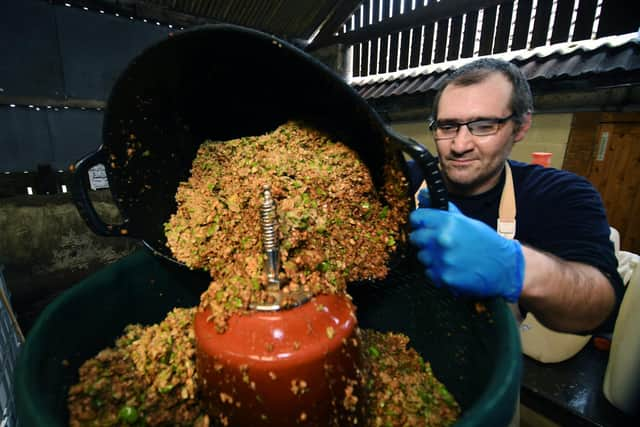Unusual year for Yorkshire's orchards leaves cider makers with excess apples


Then came a late frost, followed by a June fruit drop and drought, in what has proved to be a most unusual year for the region's abundant orchards still swelling in fruit.
Yet with most music and food festivals cancelled, some have said, they are in an unusual quandary amid a distinct excess of apples in Yorkshire.
Advertisement
Hide AdAdvertisement
Hide Ad"We are in a peculiar place where we have a lot more than we should have for this time of year," said Cameron Smith of Orchards of Husthwaite. "There's going to be a surplus of cider."


Rob North bought the Holmfirth farm which is home to Pure North Cider 15 years ago, pressing his own apples with his brew securing significant acclaim.
Centuries ago, he said, much of Yorkshire's landscape had been given to orchards, before the land was turned over to agriculture in fuelling the industrial revolution.
"It disappeared, but it's coming back now," he said. "Yorkshire is becoming better known now for it's cider, and we've at least 10 producers flourishing now."
Advertisement
Hide AdAdvertisement
Hide AdThe Autumn harvest in Holmfirth is days away, and Mr North waits for the first apples to drop. He too uses the phrase "peculiar" when it comes to this year's art of cider making.


"We need a mild spring, and a relatively mild English summer," he said. "It's been the wrong way round."
A frost pocket in the valley had seen an early fruit drop, and a loss of many of his juicing apples, while a predicted dip in the cider apples' bi-annual bloom never materialised.
"In many ways it's worked out quite well," he said. "We will have a low yield, but we've a lot of liquid left from last year. We were expecting a bad year but it's not been too bad. We will still be able to make plenty of apple juice."
Advertisement
Hide AdAdvertisement
Hide AdCider traditions in the original 'orchard village' of Husthwaite date back to the 17th century, and a time when Captain Cook and the Whitby whalers could exchange ship's timbers for a brew.
They were revived under a community enterprise in the early 2000s, when the first of 1,500 trees were planted on census mapping, and the first cider brewed by village history society volunteers in 2009.
Mr Smith, now owner of the Hambleton orchards which has been apple pressing for three weeks, credits the fertile landscape's loamy soil and unique micro-climates for its' ample annual harvest, even in a tough year such as 2020.
The challenge lies in sales, he said, on the back of a slow start to the selling season in spring. As well as the 1,500 trees he harvests every autumn, there are local gatherers' offerings he usually takes in for pressing from a dozen surrounding villages.
Advertisement
Hide AdAdvertisement
Hide Ad"I can't do it this year, we haven't the space," he said. "A barn is a barn, there's a finite space. Most of us don't need any apples this year.
"There's no music festivals, no food festivals," he added. "It's been a scorched earth economy for cider selling. It is a real shame, but we are where we are. Traditionally made cider, the way we make it, can keep for three years. It gets better as it matures."
The walled gardens at Ryedale's Nunnington Hall have proved a saviour for its autumn harvest as it predicts a "good apple year" despite late frosts.
Head gardener at the North Yorkshire country house, Nick Fraser, said the gardens were flourishing despite the threat, which had seen him cautiously covering plants in anticipation.
Advertisement
Hide AdAdvertisement
Hide Ad"A late frost has the biggest impact on any English garden," he said. "We had a really good spring, followed by a good summer. We're in a walled garden, so that is what spared us."
There are 20 different varieties of apples at Nunnington, which will likely go to the kitchens for pies and tarts as well as being sold, with any excess made into cider as a thank you to volunteers.
"The problem late in the summer is having enough sunshine to sweeten the fruit up," said Mr Fraser. "Right now, we are just hoping. Ours aren't quite ready yet, another week of good sun will really redden them up and get the sweetness into them."
-------------------------
Support The Yorkshire Post and become a subscriber today.
Your subscription will help us to continue to bring quality news to the people of Yorkshire. In return, you'll see fewer ads on site, get free access to our app and receive exclusive members-only offers.
Advertisement
Hide AdAdvertisement
Hide AdSo, please - if you can - pay for our work. Just £5 per month is the starting point. If you think that which we are trying to achieve is worth more, you can pay us what you think we are worth. By doing so, you will be investing in something that is becoming increasingly rare. Independent journalism that cares less about right and left and more about right and wrong. Journalism you can trust.
Thank you
James Mitchinson
Comment Guidelines
National World encourages reader discussion on our stories. User feedback, insights and back-and-forth exchanges add a rich layer of context to reporting. Please review our Community Guidelines before commenting.